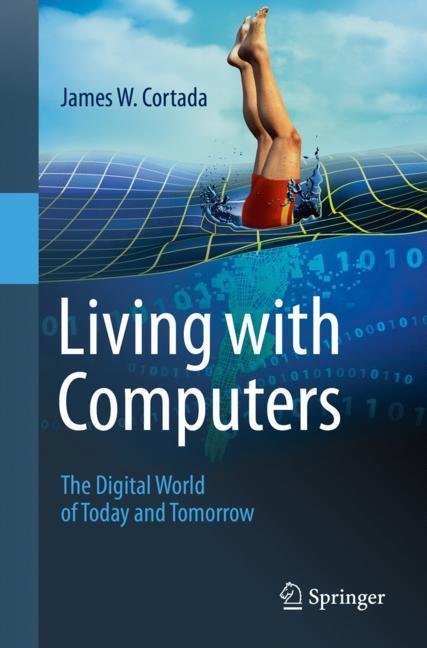James W. Cortada exposes lessons learned from the past and addresses future issues in the ever-changing human-computer interaction.

Credit: Springer Nature
Living with Computers is the most recent book from the well-known expert in the history of computers James W. Cortada. It is a call to step back and take a look at what computing means, not just to the individual, but to humanity’s existence.
It is a book about change that addresses essential questions about computing: How did we get here and how do people view computing today? Will that perception change through AI and its emerging tools? What implications and challenges will arise from developments in computing? Moreover, how can one attempt to keep up with trends in this is ever-changing interaction? The author stresses how addressing these questions is essential because according to him “in time, computing’s capabilities will be part of our social and physical DNA”.
The book is about the relationship and interaction between computers and humans. Are we prepared to think about our current or future relations with computing? Like travellers we need to ask, if we have what we need to make that journey. It comes quickly down to a form of digital literacy and our command of certain knowledge and thinking. We should begin by not assuming humans have this under control. Living with computers is a change which affects the physical being of bodies and minds. “Computing is just beginning to do that to us”, argues James W. Cortada.
This short book – arguably an extended essay – features an excellent collection of the opinion and research done by many historians, technologists, and journalists whose work is combined into a short and straightforward “jog through nearly a century of computer history.” It suggests publications for the non-specialist to keep up with computing and features a detailed index that enables any reader to browse through the book by keyword search.
The author addresses the book to the widest possible audience: It is a survival guide for those between the age of 25 and 50, a fun read for those aged 51 and 75, and a glimpse at an exciting future for the even older ones. Furthermore, it is of particular interest for those under 25 as it is a book about a change that will affect their generation the most.
###
About the author
James W. Cortada is a Senior Research Fellow at the Charles Babbage Institute at the University of Minnesota. He holds a Ph.D. in modern history and worked at IBM in various sales, consulting, management, and executive positions for 38 years, including in IBM’s management research institute, The IBM Institute for Business Value (IBV). There, he led and participated in over three dozen global studies on the use of information and business managerial practices. He is also the author of over a dozen books on the history of information technology, its business practices and industry, and about knowledge management. These include the Springer title From Urban Legends to Political Fact-Checking: Online Scrutiny in America, 1990-2015 (with William Aspray).
Cortada, James W.
Living With Computers – The Digital World of Today and Tomorrow
2020, 162 p. 72 illus., 66 illus. in colour
Hardcover 32,99 € | £27.99 | $39.99 |
ISBN 978-3-030-34361-3
eISBN 978-3-030-34362-0
Media Contact
Stefanie Schulmeyer
[email protected]
Original Source
https:/




